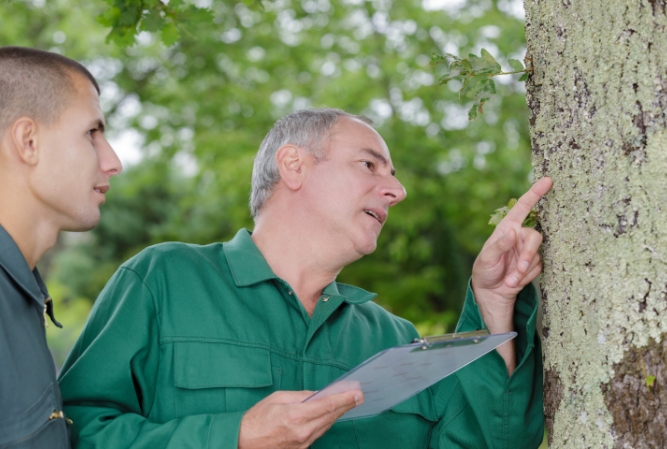Three Bugs and Critters That Can Affect Your Tree Care
We know it’s January and tree pests are probably the last thing on your mind right now, but spring will be here before you know it. All the bugs and pests will eventually resurge, putting your trees and landscaping back in the heat of battle to remain healthy.
As a Wichita tree service that’s been in the tree care industry for some years, we can tell you that half the battle is being proactive through preventative measures. That means prepping your trees before the pests have a chance to infiltrate them.
Some of these measures you’ll be able to do on your own while others are best handled by contacting a certified arborist near you. The following are some of the top tree pests you need to prepare for this spring. Remember, you can always feel free to contact our professional tree service, if you need an extra hand.
#1 – Scale Insects
Scale insects are very small, but when there are too many, they can cause big-time damage to trees. These little pests get their sustenance from sucking the juices out of plants and trees. This results in scale insects creating a sticky residue that turns into black mold. As if that wasn’t bad enough, the honeydew residue is like a beacon for wasps, bees, flies, and other insects. A scale infestation can quickly turn your yard into bug city, which makes tree care all the more difficult.
How do you get rid of scale insects?: Since scale insects can infest trees and plants alike, the best way to get rid of them is through prevention. Familiarize yourself with what scale eggs and larvae look like. You can use a toothbrush dipped in 70% isopropyl alcohol to scrub them away. You can also use dishwashing soap and water to take care of the scale insects and the honeydew residue. Commercial insecticidal soap and organic horticultural oil are also options. When it comes to tree care, it’s best to avoid harsh insecticides unless absolutely necessary.
#2 – Bagworms
The bagworm is an underrated opponent in the landscaping and professional tree service world. They typically attack spruce trees, red cedars, and juniper trees by sealing themselves into a cocoon and feeding off the tree. This results in the tree looking depleted and unsightly through loss of foliage and weakened limbs.
How do you get rid of bagworms?: Bagworms are easy to handle on your own if you have small trees. Their distinctive casings can be plucked from limbs by hand. Bigger trees are a different story. Since bagworms can attach themselves to any limb, that can make removing them from larger trees dangerous for the average homeowner. Please reach out for professional tree service if you notice bagworms you can’t remove yourself.
#3 – Bronze Birch Borer
The bronze birch borer is roughly a half an inch in size and is known for its bronze-tinted wings and body. This beetle is notorious for destroying birch trees – hence, the name. Once this particular type of borer invades a tree, homeowners will notice that their tree loses foliage and has dead branches. Additionally, certain parts of the tree may start to appear swollen and misshapen.
How do you get rid of the bronze birch borer?: Once again, the best way to get rid of a pest is to prevent it from invading. Since the bronze birch borer invades weakened trees, your best course of action is to keep up with a tree care regimen that keeps them in good shape. There are specific applications that can be made to areas of the tree that a borer would typically invade. Please contact a certified arborist near you to identify those patches and get the right tree care. The bronze birch borer is a tricky pest to handle, so it’s best left to a tree specialist to snuff them out.
How to Book Tree Care with a Wichita Tree Service Near You
You can never be too proactive when it comes to preventing tree pests. Winter is usually an ideal time to get trees inspected by a tree specialist to properly evaluate what level of tree care that you need.
To get in touch with a certified arborist near you about pest prevention, contact Huff’s Tree Service. We can send out a tree specialist who is skilled in evaluating trees that are vulnerable or are already compromised by insects and pests. We also offer a full suite of professional tree services that will help prepare your trees to endure the duration of the winter season.
You can get in touch with us by using the contact form on our website or by calling (316) 871-3841 during our normal business hours (M-F: 8am to 4pm).


